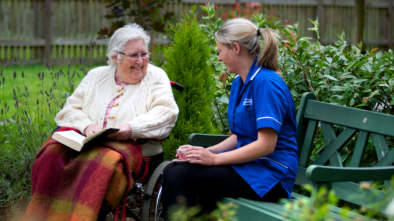Tips for carers and families looking after someone with dementia at home
Caring for a loved one with dementia at home
For people living with dementia, moving to a residential care home used to be seen as the obvious option when the disease progressed. However, with research suggesting that dementia sufferers can benefit from the continued familiarity of remaining at home, live-in care is recognised as an increasingly viable option. Live-in care allows loved ones to receive personalised care in familiar, reassuring surroundings. There are challenges to be sure but with a little extra understanding and some small adjustments, you can help adapt your home life to be better for a loved one with dementia.
Here some tips and support ideas for those caring for someone with dementia at home


Remember who you’re caring for
Despite the progressive symptoms of dementia, your loved one is still the same person they were. While short-term memory loss can be an increasing issue, people with dementia can find it easier to remember things from their youth, so using memories from that time can help make sense of their current situation. Try to fill your home with photographs, pictures and memorabilia from their past and relate current events where you can to situations they remember from the past.
Say it right
It’s a good idea to avoid generating situations that can lead to stress and anxiety so try and think about how you speak to someone with dementia.
– Don’t be demanding: Avoid direct questions which can put them on the spot. Asking them what they’ve done or why they’ve done something can force them to search for facts that they might struggle to remember. This frustration can be very upsetting so try adopt a conversational style that engages them without demanding anything of them. So instead of asking: “What did you have for lunch today?” start the conversation by saying “Oh I did enjoy those sandwiches we had for lunch,” then let the conversation evolve from there.

– Listen to them: There can be a lot more to a question from a person with dementia than first appears. It might reflect their immediate concerns and be a strong indicator of their current state of mind. Try not to ask them what they mean and instead seek to reassure them with a positive, calm response.




